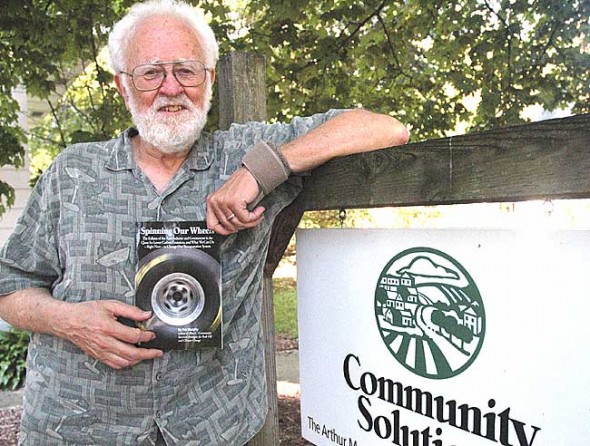
Recently Pat Murphy of Community Solutions published his third book on energy conservation, Spinning Our Wheels, in which he examines myths about the electric car.
Murphy examines cars, consumption
- Published: September 2, 2010
Electric cars may not be the answer to reducing our dependence on fossil fuels, says local author Pat Murphy in his recently-released book, Spinning Our Wheels.
Instead, Murphy proposes, we should share rides to increase transportation’s efficiency and reduce the number of total cars on the road.
“The popular way this has been promoted is to note the electric car doesn’t emit CO2,” Murphy said in a recent interview. “But [CO2] is emitted at a few thousand power plants in the U.S. with coal and natural gas the leading fuels in electricity production.”
Murphy challenges what he considers misleading statements by automobile companies and U.S. government officials in the book, published in July by his organization, local nonprofit Community Solutions.
“The claims made for these new products imply revolutionary breakthroughs that eliminate any need to actually reduce consumption,” Murphy writes in the book’s preface. “It allows the continuation of the dream of a car (or two or three) in every garage in every household in the world.”
In his book Murphy cites a growing number of technological challenges, including an insufficient global supply of the lithium used in electric vehicles’ batteries, the high cost of the vehicles, and short battery ranges of fewer than 100 miles.
Even if these problems were overcome, Murphy said, the electric car still only generates 15 to 20 percent less carbon dioxide than the internal combustion engine — nowhere near the 80 to 90 percent reduction required to forestall climate changes.
“We need to start reducing the number of power plants now,” Murphy said. “If we committed to the electric car, we will be committing to more power plants over the next 20 years.”
The 96-page book is available for free download from Community Solutions’ Web site, http://www.communitysolution.org, or in hard-copy format for $12.95 from the site or the office at 114 East Whiteman Street.
Spinning Our Wheels is the second in a series of three books Murphy is writing on how to dramatically reduce energy use in the areas of personal car use, building operation and food consumption, which together account for two-thirds of total U.S. energy use. Before the series, Murphy published the more theoretical tome, Plan C: Community Survival Strategies for Peak Oil and Climate Change, which came out in 2008 from New Society Publishers.
Last fall, Community Solutions published The Green Tragedy: LEED’s Lost Decade, which critiques the government program Energy Star and U.S. Green Building Council’s LEED certification for their low energy reduction targets and performance.
“This book is intended to expose the false solution of LEED,” Murphy writes in the preface. “It calls for more stringent energy requirements and argues that human survival is dependent on lowering CO2 emissions, not garnering green points.”
In The Green Tragedy, Murphy suggests as an alternative the German Passive House standard, which has been shown to reduce building energy consumption by 80 to 90 percent using thick, tight building construction.
“I’m trying to provide solutions that will meet the reduction in a timely way,” Murphy said. “My object is to find off-the-shelf solutions that guarantee we can meet the reduction.”
Spinning Our Wheels includes a section on the Smart Jitney, a ridesharing model Murphy invented that uses cell phone and GPS technology to increase vehicle occupancy from one-and-a-half people per vehicle to three. Murphy is currently working with Sean O’Sullivan of the Irish company Avego, who has met with local Miami Valley Regional Planning Commission officials and promised to make their ridesharing software available to Yellow Springs.
The working title of Murphy’s next book is Climate Change or Diet Change. The book covers the grain-based animal food system, which generates nearly 20 percent of global carbon dioxide emissions.
Community Solutions, formerly Community Service, Inc., has taught about small, local community living for the last 70 years, more recently focusing on reducing energy consumption.
“Small, local communities are always more energy-efficient,” Murphy said. “So communities such as Yellow Springs are ultimately the way we’ll all be living.”
The Yellow Springs News encourages respectful discussion of this article.
You must login to post a comment.
Don't have a login? Register for a free YSNews.com account.












No comments yet for this article.